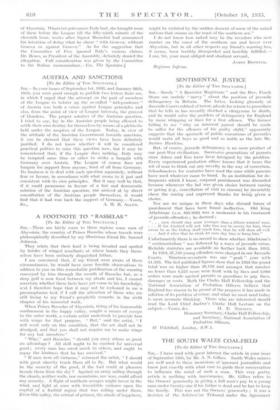SENTIMENTAL JUSTICE
Stone are unduly " nervy " about the position of juvenile delinquency in Britain. The latter, looking gloomily at Juvenile Courts robbed of terror, pleads for return to procedure that he tells us has recently shocked a clergyman to death, and he would solve the problem of delinquency for England by more whipping or fines for a first offence. The former failing to see " why an innocent parent should be made to suffer for the offences of his guilty child," apparently suggests that the spectacle of public executions of juveniles would make all boys as good and as noble as the late Mr. Justice Hawkins.
But, of course, juvenile delinquency is no mere product of our post-War civilisation. Successive generations of parents since Adam and Eve have been intrigued by the problem. Every experienced probation officer knows that it taxes the wit of man to think out any novelty in the way of correction. Schoolmasters for centuries have used the cane while parents have used whatever came to hand. In an institution for de- linquents which I know, corporal punishment was discarded
because whenever the lad was given choice between caning or gating (e.g., cancellation of visit to cinema) he invariably
chose the caning and expressed thanks for being given a choice.
Nor are we unique in these days who discard forms of punishment that have been found ineffective. Old King Athelstane (A.D. 895-939) was a modernist in his treatment of juvenile offenders ; he decreed :
" . . men should slay none younger than a fifteen winters' man. . . If his kindred will not take him nor be surety for him, then s. wear ho as the bishop shall teach him, that ho will shun all evil. . . . And if after that lie steal, let men slay him or hang him."
Unfortunately there is no record to show whether Athelstane's " sentimentalism " was followed by a wave of juvenile crime. Reliable statistics are available no further back than 1913.
In 1913, 37,520 young offenders were charged in our Juvenile Courts. Nineteen-seventeen was our " peak " Tear with 51,823. The last published figures show that in 1938 the grand total was no higher than 29,133 and amongst that number no fewer than 4,225 cases were dealt with by fines and 3,080 orders were made against parents or guardians to pay fines, damages or costs. Both the Clarke Hall Fellowship and the National Association of Probation Officers belieVe that England has reason to be proud of the progress it has made in solution of its problem of crime, and what we most need today is more accurate thinking. Those who are interested should read the Lord Chief Justice's Clarke Hall Lecture on the Honorary Secretary, Clarke Hall Fellowship, and Secretary, National Association of Probation Officers.
47 Whitehall, London, S.W.1.


























































 Previous page
Previous page